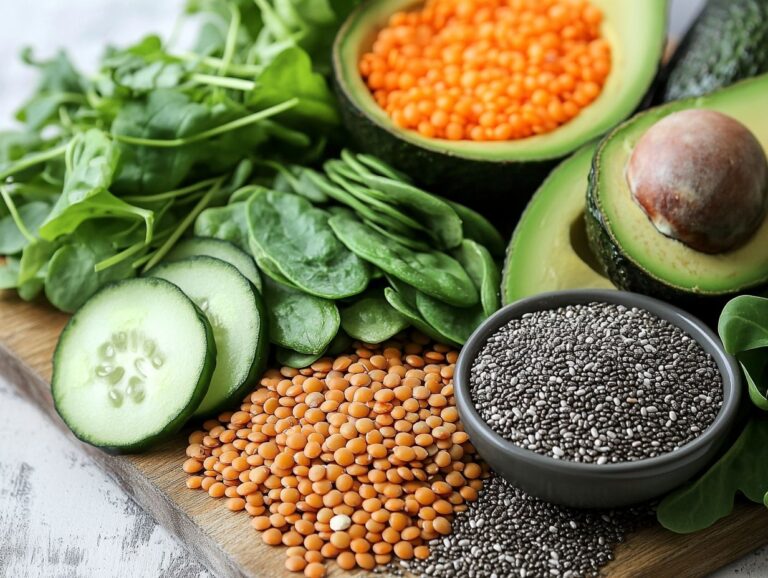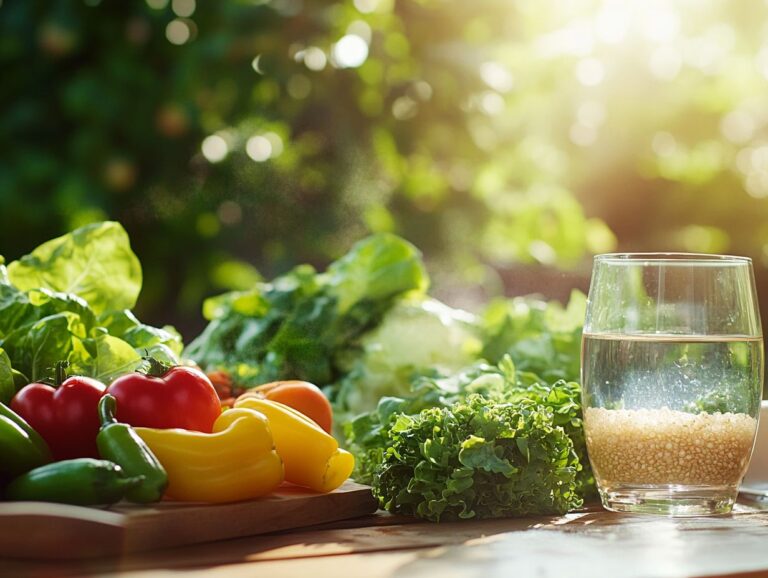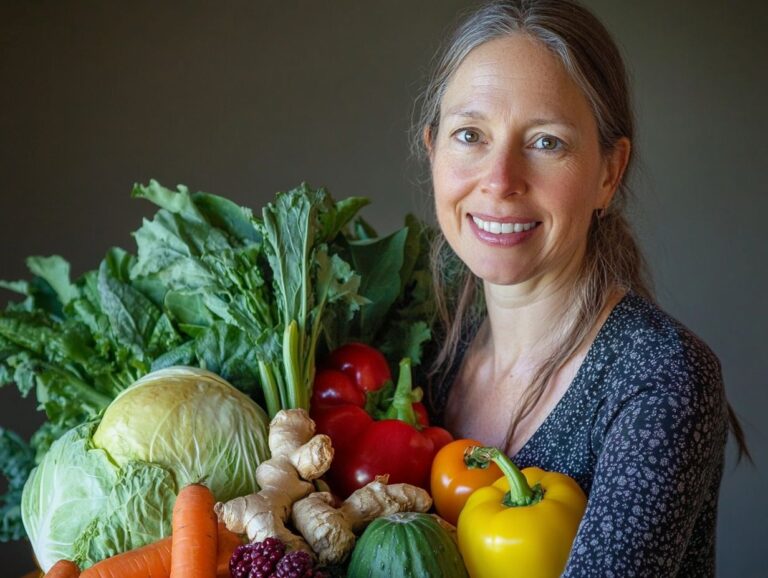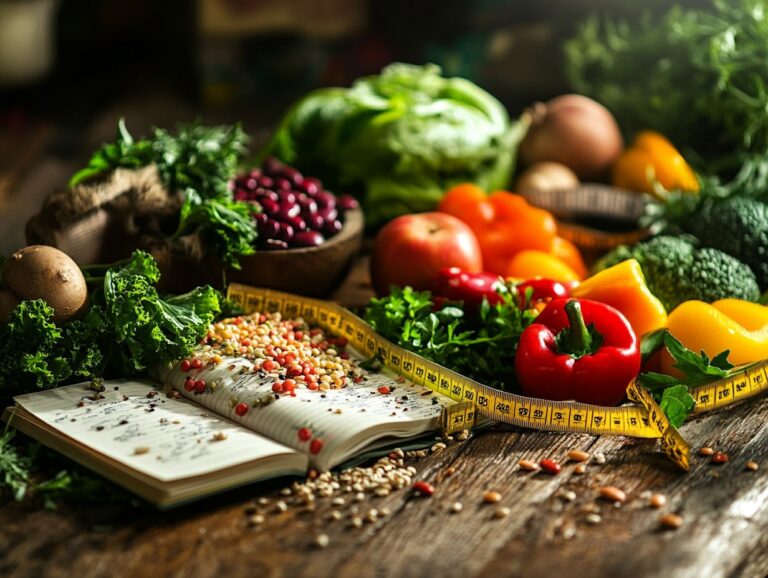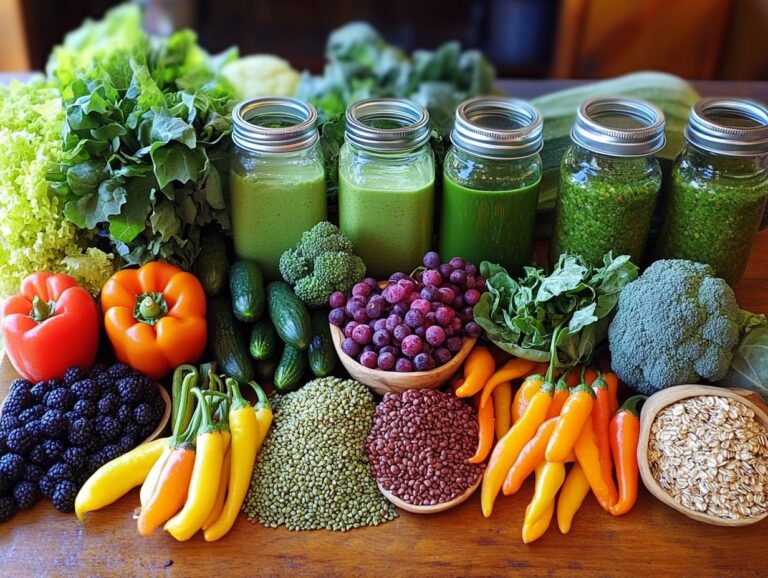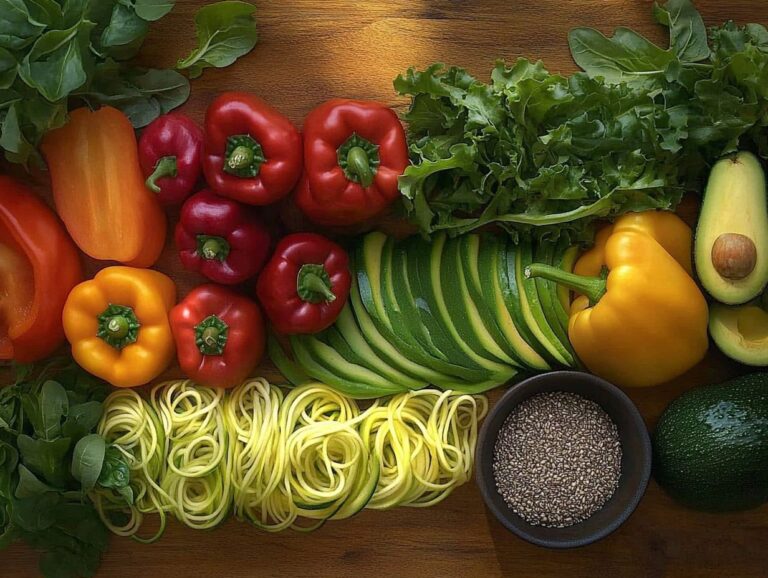The article explores the fundamentals of veganism, covering the principles of a vegan diet, the reasons individuals choose this lifestyle, its various components, and guidelines on what to eat and what to avoid. Additionally, it provides tips for transitioning to a vegan diet and offers advice on how to ensure that one receives all the necessary nutrients while following this dietary approach.
What Is a Vegan Diet?
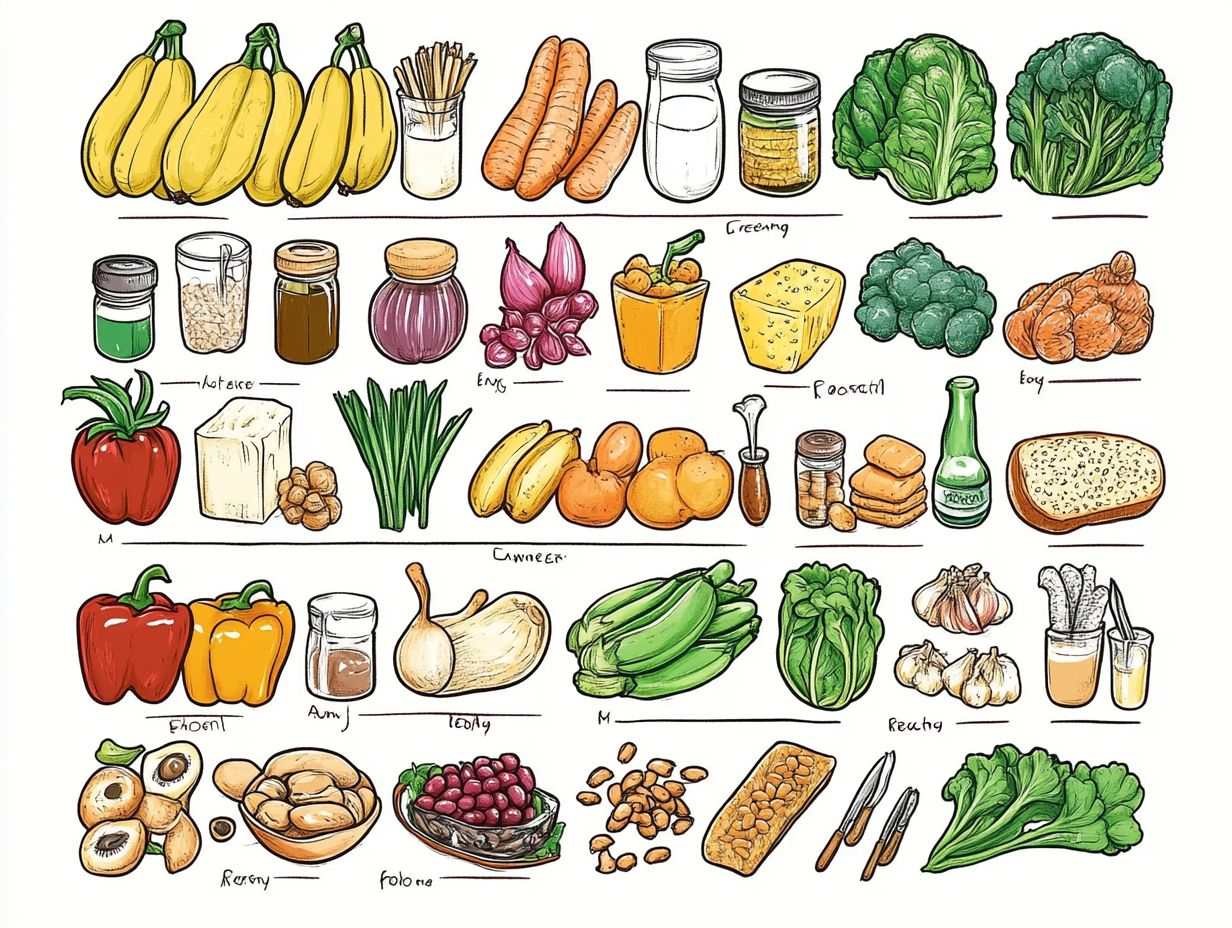
Veganism and plant-based eating share similarities in that both emphasize diets predominantly composed of plant-derived foods. However, a vegan diet is a more restrictive version of a plant-based diet that excludes all animal products, focusing on healthy and nutrient-rich foods from plant sources.
This diet primarily includes a variety of fruits and vegetables, legumes, whole grains, nuts, and seeds, along with fortified foods such as nutritional yeast to ensure adequate intake of essential nutrients that are crucial for overall health and may otherwise be lacking. These nutrients include:
- Protein
- Omega-3 fatty acids
- Calcium
- Iron
- Vitamin B12
- Vitamin D
Adopting a vegan lifestyle is associated with numerous health benefits, including improved heart health, enhanced gut health, and a reduced risk of certain nutrient deficiencies, particularly concerning vitamin B12, calcium, iron, and omega-3 fatty acids.
Why Do People Choose to Follow a Vegan Diet?
People adopt a vegan diet for various reasons, including health benefits, ethical concerns, and environmental considerations. It aligns with dietary guidelines promoting plant-centric diets and encourages the intake of nutrient-rich foods.
These factors contribute to a growing awareness of how dietary choices affect both individual and planetary health. Many individuals choose plant-based diets to promote cardiovascular health, manage their weight, and prevent chronic diseases, while others do so to reduce animal suffering and lower their carbon footprint.
What Foods Are Included in a Vegan Diet?
A vegan diet consists of a diverse array of foods that focus on plant-based proteins, whole grains, fruits, vegetables, legumes, nuts, and seeds, all of which provide the essential nutrients required for a healthy lifestyle. Utilizing non-dairy milk options like almond or soy milk can further enrich one’s nutritional intake.
Foods such as tofu, tempeh, quinoa, lentils, and non-dairy milk can be easily incorporated into daily meal planning, ensuring that individuals receive the nutrients they need while enjoying delicious and healthy meals.
1. Fruits and Vegetables
Fruits and vegetables are essential components of a vegan diet, providing a wide range of nutrients, including vitamin C, dietary fiber, and important antioxidants that contribute to maintaining good health. The diverse colors and types of produce available make it easy to plan creative meals that align with healthy diet guidelines while also enhancing gut health and overall well-being.
One can easily elevate their meals by incorporating berries, leafy greens, and cruciferous vegetables, among others.
- Berries, in particular, are excellent sources of antioxidants and are known to help prevent chronic diseases.
- Leafy greens, such as spinach, are rich in iron and calcium, which are vital for energy and bone health.
- Colorful vegetables like bell peppers and carrots are abundant in beta-carotene and vitamin A, both of which play significant roles in supporting vision and immunity.
By consuming a variety of fruits and vegetables, individuals can ensure that their dietary needs are effectively met.
2. Whole Grains
Whole grains play a crucial role in a vegan diet, serving as some of the primary sources of energy. They provide dietary fiber, essential micronutrients, and numerous health benefits, including aiding in the management of heart disease and enhancing energy sources.
Grains such as quinoa, brown rice, oats, and whole wheat bread have been shown to improve digestive and metabolic health, stabilize blood glucose levels, and support cardiovascular health.
Plus these grains, amaranth and millet are excellent choices for vegans, as they are rich in proteins and essential amino acids, which are vital for muscle repair and overall energy enhancement.
Barley, known for its high beta-glucan content, can help lower cholesterol levels and improve cardiovascular health, aligning with dietary guidelines that emphasize the importance of incorporating whole foods into the diet.
Regular consumption of these grains ensures adequate intake of B vitamins, iron, and magnesium, all of which are essential for maintaining energy levels.
3. Legumes and Beans
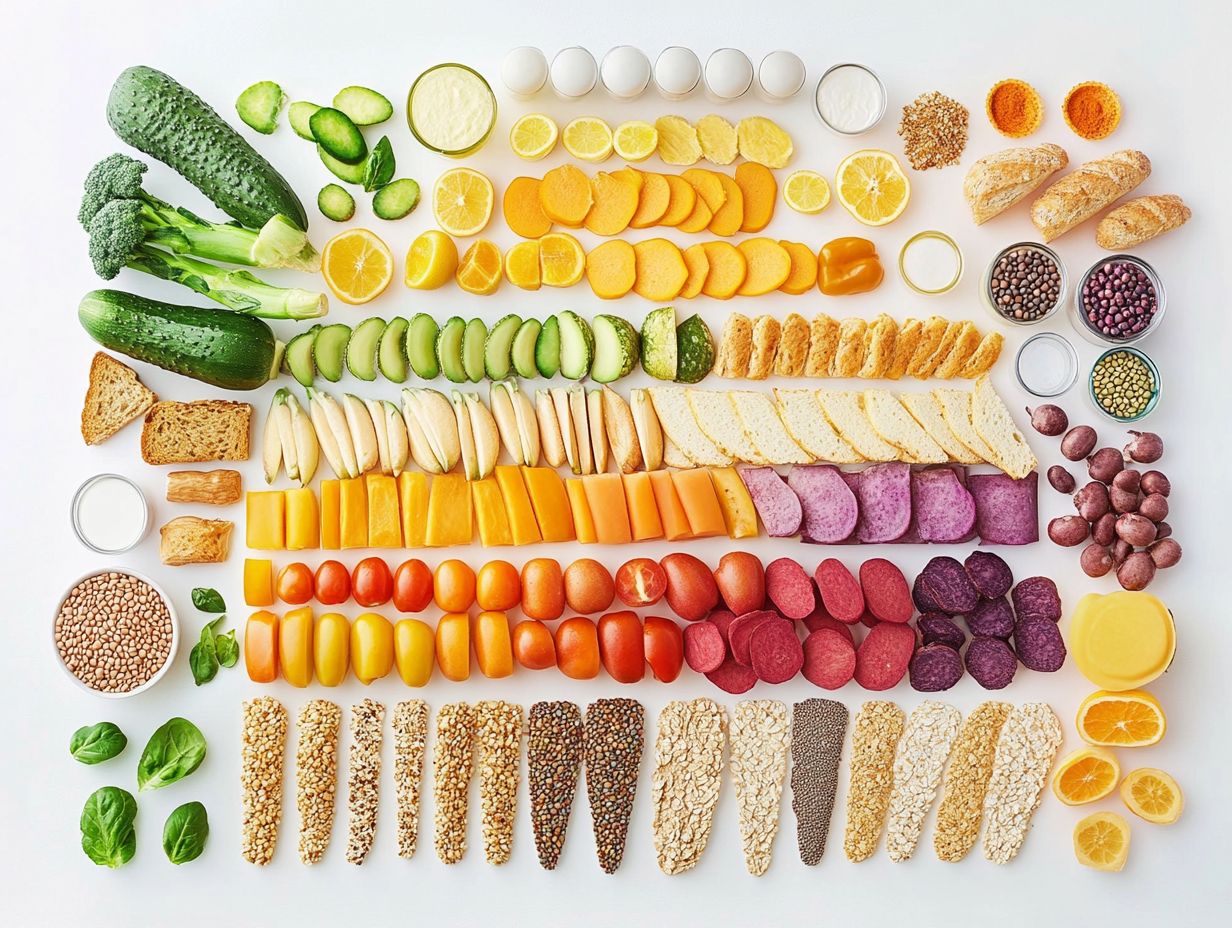
Legumes and beans are among the best sources of vegan protein. They are rich in essential nutrients such as iron, fiber, and various key vitamins.
Incorporating legumes and beans into meal planning can help ensure balanced levels of important nutrients. Plus providing vital macronutrients, legumes and beans allow individuals who do not consume animal products to meet their daily protein and iron requirements.
For instance, lentils are particularly high in folate and magnesium, chickpeas provide manganese and phosphorus, and black beans are recognized for their antioxidant properties.
Including legumes in dishes like stews or salads and as side options not only supports energy needs but also promotes healthy bodily functions. Utilizing a variety of legumes and beans enhances both the health benefits and the diversity of taste and texture in a vegan diet.
4. Nuts and Seeds
Nuts and seeds are a vital component of a vegan diet, offering healthy fats, protein, and a range of vitamins and minerals essential for overall health. For example, almonds, walnuts, chia seeds, and flaxseeds are not only nutritious and delicious on their own but also provide omega-3 fatty acids and other key nutrients necessary for a balanced diet. Incorporating these nutrient-dense foods into daily meals can enhance dietary diversity and help meet nutritional requirements.
Here are some of the benefits:
- Almonds: Rich in vitamin E, which promotes healthy skin.
- Walnuts: High in antioxidants.
- Chia and flaxseeds: Offer plant-based protein, making them an excellent choice for a vegan diet.
Together, these foods help satisfy hunger, support heart health, and aid in weight management, enriching a healthy vegan diet.
5. Plant-based Proteins
Plant-based proteins such as tofu and tempeh are essential components of a vegan diet. They serve as versatile and nutritious substitutes for meat and dairy while providing essential amino acids and other important nutrients.
Plus tofu and tempeh, there is a wide variety of other plant-based protein sources, including:
- lentils
- chickpeas
- quinoa
- an assortment of nuts and seeds
Each of these options boasts its own unique nutritional profile, offering adequate protein content along with fiber, vitamins, and minerals that are vital for overall well-being. For instance, lentils are rich in iron, while quinoa is considered a complete protein, making it particularly valuable for meal planning.
By incorporating these ingredients into salads, stir-fries, and smoothies in creative ways, individuals can achieve their protein intake goals without relying on animal products, thereby fostering a balanced and sustainable diet.
What Foods Should Be Avoided on a Vegan Diet?
A vegan diet excludes animal products, processed foods, and added sugars, as these components can undermine the benefits of a plant-based diet and the intake of essential nutrients. Setting a proper grocery list and meal planning can help maintain a healthy eating routine that’s both delicious and beneficial.
By avoiding meat, dairy, eggs, and other animal-derived ingredients, individuals can reduce their risk of heart disease, obesity, and other chronic conditions.
1. Animal Products
In a vegan diet, animal products such as meat, dairy, and eggs are avoided due to the increased health risks and ethical concerns associated with their production and use. These exclusions are part of a greater commitment to plant sources, which support a sustainable and ethical lifestyle.
Consumption of animal foods has been linked to higher rates of chronic diseases and environmental damage. Research consistently shows a connection between the consumption of animal products and an elevated risk of heart disease, obesity, diabetes, and certain cancers.
Ethical considerations regarding animal husbandry encompass issues of animal welfare and the moral responsibilities consumers have regarding their food choices. By opting for plant-based foods, individuals can better protect their health while also making a positive impact on the planet by reducing greenhouse gas emissions associated with livestock production.
This approach can contribute to creating a healthier and more ethical world while helping individuals achieve their health and ethical goals.
2. Processed Foods
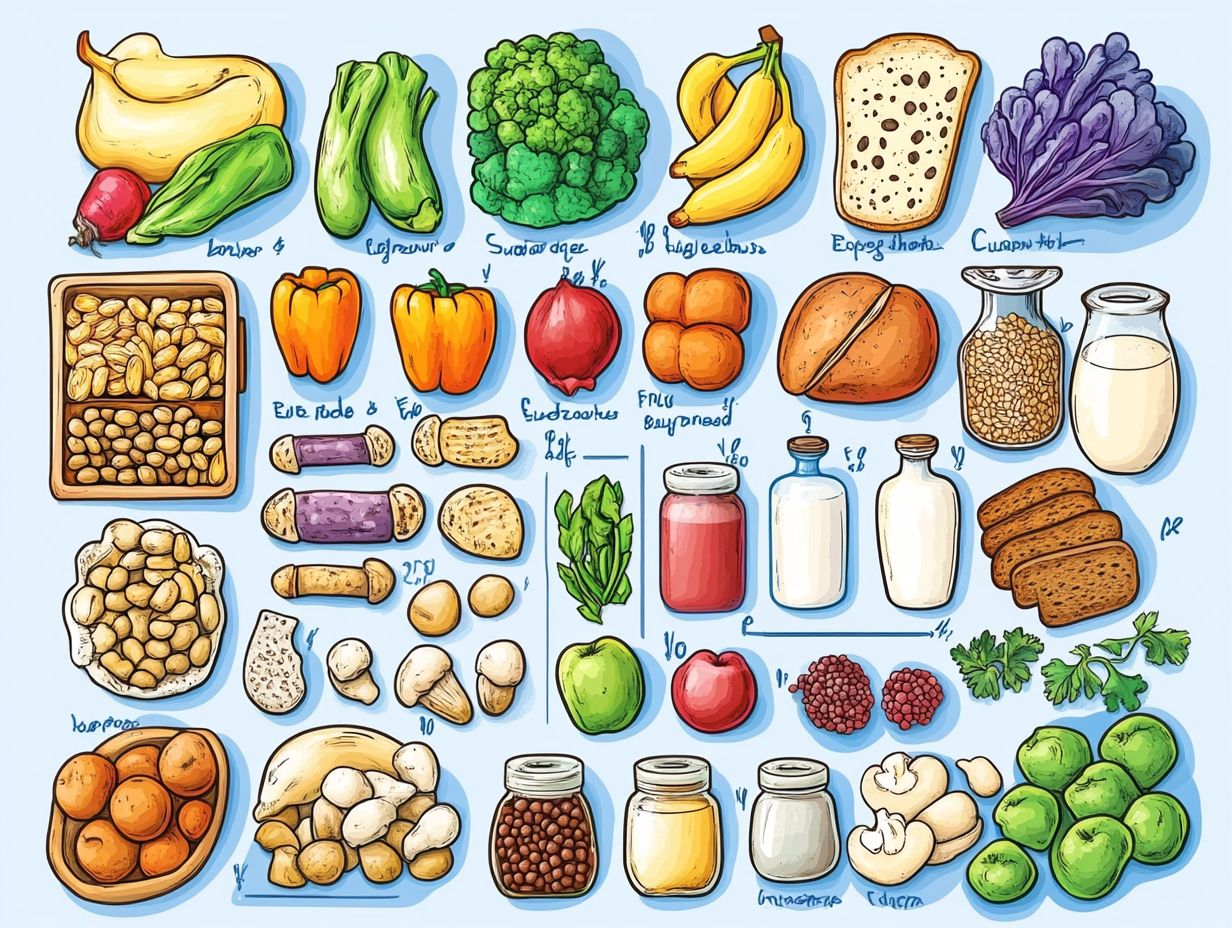
Processed foods are often high in added sugars, unhealthy fats, and preservatives, making them detrimental to a vegan diet that aims to maximize health benefits and minimize nutrient deficiencies.
In contrast, whole, minimally processed foods ensure that individuals receive the full range of nutrients essential for optimal health and well-being.
The overconsumption of processed vegan products can lead to deficiencies in vital vitamins and minerals, such as B12, iron, and omega-3 fatty acids, which are necessary for maintaining energy levels and overall immunity.
Over time, these deficiencies can result in various health issues, including fatigue, anemia, and an increased risk of chronic illnesses.
Additionally, many processed vegan products are low in fiber and high in sodium, which can disrupt digestion and contribute to hypertension, ultimately undermining the purpose of a plant-based diet focused on wellness.
3. Added Sugars
The negative effects of added sugars on a vegan diet can include weight gain, insulin resistance, and various chronic health issues. Therefore, it is essential to limit foods high in added sugars and replace them with options rich in naturally occurring sugars, such as whole fruits and vegetables, to maintain a healthy diet.
Added sugars in vegan diets can contribute to inflammation, negatively impacting overall health and exacerbating conditions like diabetes and heart disease. Many processed vegan foods, often misrepresented as healthy sources of nutrition, can be laden with harmful added sugars.
For this reason, individuals following a vegan diet should carefully read ingredient labels and opt for alternatives like natural sweeteners, such as agave, maple syrup, or date sugar.
Incorporating a wide variety of whole foods can help create a nutrient-dense diet that promotes good health while reducing the risk of adverse effects associated with excessive sugar consumption.
How to Plan a Balanced Vegan Diet?
A well-planned balanced vegan diet, or plant-based diet, consists of foods with high nutrient density that align with dietary guidelines, ensuring that all necessary nutrients for health are adequately supplied through healthy eating practices.
Such a diet should incorporate a variety of fruits, vegetables, whole grains, legumes, nuts, and seeds, as well as fortified foods to ensure all essential nutrients are included, allowing for diverse and enjoyable meals that meet nutritional requirements.
1. Focus on Nutrient-Dense Foods
The best vegan diet incorporates nutrient-dense foods, as they offer essential nutrients without unnecessary calories and unhealthy fats. It is important to prioritize whole foods such as fresh fruits, vegetables, legumes, and whole grains to maximize health benefits, including better gut health, and minimize nutrient deficiencies.
These foods are rich in vital vitamins and minerals, as well as antioxidants and phytochemicals that help reduce inflammation and provide various health benefits. For instance, leafy greens like kale and spinach are excellent sources of iron and calcium, while beans and lentils are rich in protein and fiber.
Although quinoa is often regarded as a superfood, it is noteworthy that even in small amounts, it serves as a complete protein and contains omega-3 fatty acids and is part of core protein sources in a plant-based diet.
2. Incorporate a Variety of Plant-based Proteins
In a vegan diet, incorporating a variety of plant-based protein sources is essential to meet protein intake requirements while providing a range of amino acids and additional nutrients. Sources such as tofu, tempeh, lentils, chickpeas, and nuts ensure that individuals receive adequate protein from diverse origins, which is vital for overall health. Including these protein sources also contributes to the intake of healthy fats and energy sources.
This increased variety enhances the nutrient density of the diet and helps reduce the risk of deficiencies that can arise from restrictive eating patterns. For instance, legumes offer fiber, iron, and folate, while nuts are rich in healthy fats and vitamin E. Whole grains, such as quinoa and brown rice, supply additional amino acids that complement those found in other sources.
By including a broad array of plant proteins, it becomes easier to obtain all essential amino acids, which are necessary for muscle repair, hormone production, and immune function, promoting positive health outcomes.
In summary, a diverse selection of vegan protein sources is crucial for optimal health and overall well-being.
3. Consider Supplements
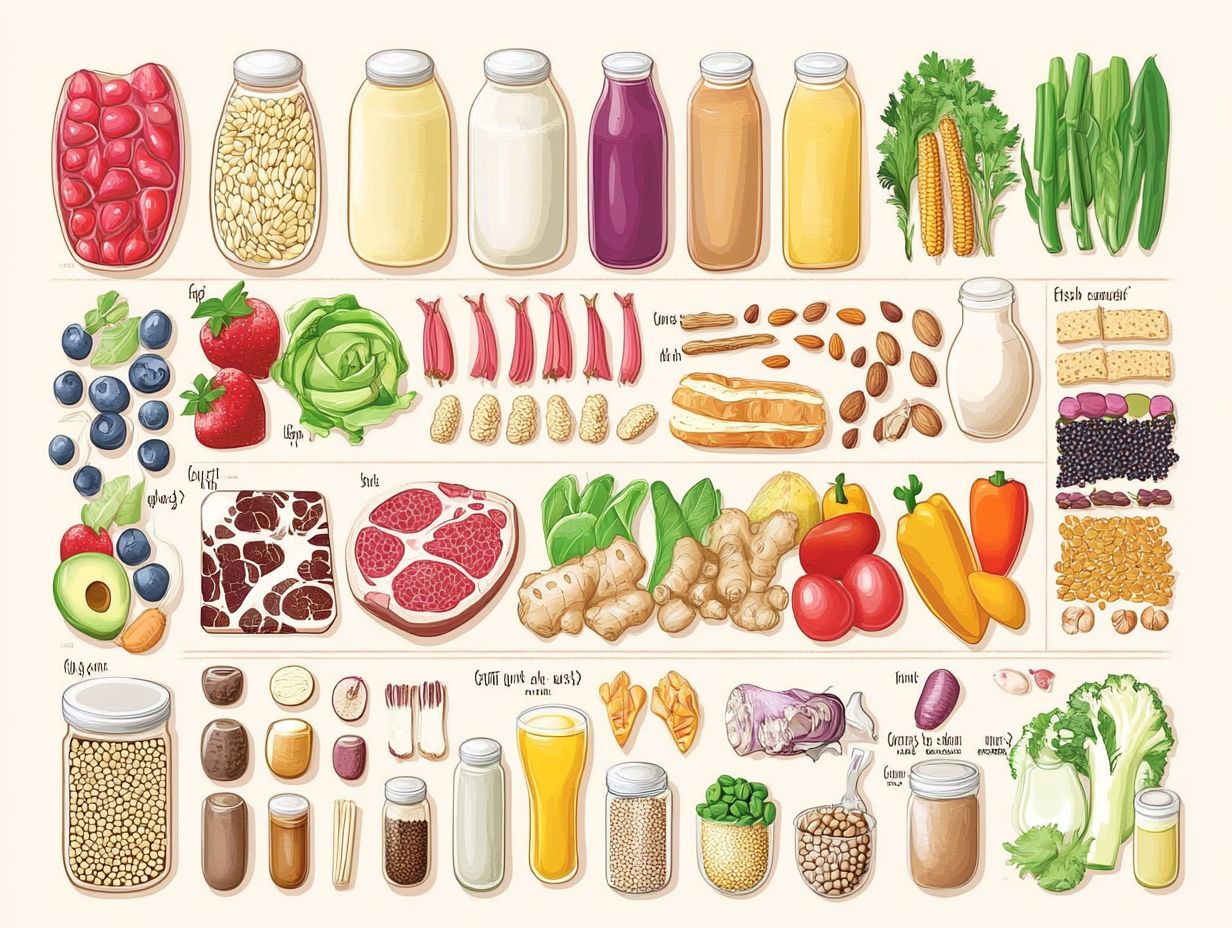
Dietary supplements can be beneficial for vegans by providing important nutrients and addressing potential deficiencies arising from the absence of animal products in their diets. While a well-planned vegan diet can supply most essential nutrients, including vitamin B12 and vitamin D, supplementation may be necessary to ensure optimal health and well-being, particularly for pregnant vegans or those breastfeeding.
Vegans should pay particular attention to certain vitamins and minerals that are predominantly found in animal products. The most significant concern is vitamin B12, which is crucial for the proper functioning and development of brain and nerve cells, as well as for the production of DNA and red blood cells; it is virtually absent in plant foods.
Omega-3 fatty acids, specifically EPA and DHA, are typically found in fish, so vegans should consider algae-based omega-3 supplements. Additionally, vitamin D, which plays a vital role in bone health and the immune system, may need to be taken in supplement form, particularly in regions with limited sunlight.
Iron and calcium are also nutrients that are more challenging to absorb from non-animal sources, making supplementation important for maintaining a balanced vegan diet. Calcium sources such as fortified non-dairy milk and iron sources like fortified cereals should be incorporated into meal planning.
Tips for Transitioning to a Vegan Diet
Transitioning to a vegan diet can be a delightful journey filled with new flavors and options; however, it requires careful meal planning and grocery list creation to ensure that all essential nutrients are consumed. This process includes exploring food alternatives, such as non-dairy milk, plant-based protein sources, and fortified foods, and considering different cooking styles to enhance meals.
To facilitate this transition, one can begin by planning weekly meals, which will help ensure a diverse intake of fruits, vegetables, whole grains, and legumes, resulting in a balanced diet.
A shopping list for a vegan diet should include staples like:
- Lentils
- Chickpeas
- Quinoa
- Nut butters
Experimenting with various dairy substitutes, such as almond yogurt or coconut cream, can effectively replace conventional dairy products, while seeking out vegan cheeses and meats can help satisfy cravings for vegan snacks. Additionally, cooking in bulk and trying new recipes can ensure that every meal remains both healthy and delicious, supporting a plant-centric diet.
How to Make Sure You’re Getting Enough Nutrients on a Vegan Diet?
Maintaining adequate nutrient intake is essential on a vegan diet to support overall health and prevent deficiencies. This is particularly important for essential nutrients such as protein, iron, calcium, and vitamin B12, which can be challenging to obtain from plant sources alone. Utilizing the Eatwell Guide can assist in ensuring a balanced intake of nutrient-rich foods.
1. Protein
Protein is an essential macronutrient in a vegan diet, and adequate consumption can be achieved by including a variety of plant-based protein sources such as legumes, nuts, seeds, and whole grains.
By diversifying their protein sources, vegans can meet their daily protein requirements while also obtaining additional nutrients from these foods. The daily protein requirement varies based on age, gender, and physical activity level; however, adults generally need about 0.8 grams of protein per kilogram of body weight. Ensuring adequate protein intake supports cardiovascular health and proper energy levels.
For those following a vegan diet, it is crucial to combine protein-rich foods with other nutrient-dense options, such as vegetables and healthy fats, to create balanced meals that adhere to dietary guidelines.
For instance, pairing beans with rice or adding nut butters to smoothies can enhance the quality of protein and overall nutrition. Plus supporting muscle health, a well-rounded diet aligned with a plant-based lifestyle can help maintain proper energy levels and improve heart health.
2. Iron
Iron is an essential nutrient for vegans, although its sources differ from those in an omnivorous diet. Adequate sources of iron for vegans include legumes, lentils, tofu, dark leafy greens, and fortified foods, which can help maintain healthy iron levels and prevent deficiency. Combining iron sources with foods rich in vitamin C enhances absorption and supports better health outcomes.
The type of iron found in plant foods is known as non-heme iron, which is less efficiently absorbed by the body compared to heme iron from animal sources. To enhance the absorption of non-heme iron, it is beneficial to consume foods rich in vitamin C—such as citrus fruits, tomatoes, and bell peppers—alongside iron-containing foods, as vitamin C aids in iron absorption.
Additionally, cooking with cast iron pans can increase the iron content of meals. By being mindful of the factors that affect iron absorption and combining food sources strategically, a vegan diet can provide adequate amounts of iron, benefiting overall health and well-being.
3. Calcium
Calcium is essential for maintaining bone health, and many plant sources found in a vegan diet, such as fortified non-dairy milks, tofu, and dark leafy greens, provide a good amount of this vital mineral. It is crucial to consume enough calcium to prevent deficiencies and promote strong bone density. These calcium sources, combined with adequate vitamin D, support optimal nutrient absorption and health benefits.
Plus these sources, nuts, seeds, and beans contribute to calcium levels, making it easier for individuals following a plant-based lifestyle to meet their nutritional needs.
However, the body’s ability to absorb calcium can be influenced by dietary factors, such as oxalates and phytates found in certain vegetables and whole grains, which inhibit absorption. Sufficient vitamin D intake, obtained from sun exposure and fortified foods, is also necessary for optimal calcium absorption.
For those who struggle to obtain enough calcium through food alone, supplementation may be an option; however, it is advisable to consult with a healthcare professional to determine the appropriate dosage and formulation.
4. Vitamin B12
Vitamin B12 is a nutrient that is most at risk of being insufficiently consumed in a vegan diet, as it is primarily found in animal products. Consequently, individuals who adhere to plant-based diets need to seek alternative sources of this essential vitamin through fortified foods and dietary supplements.
To prevent the risks associated with vitamin B12 deficiency, vegans should incorporate fortified foods and dietary supplements into their diets. Vitamin B12 is vital for maintaining healthy nerve cells, producing DNA, and forming red blood cells. A deficiency in vitamin B12 can lead to fatigue, weakness, and neurological issues. Nutritional yeast is also a popular option for adding vitamin B12 to meals.
Fortunately, a variety of fortified foods are available, including:
- Plant-based milk
- Breakfast cereals
- Nutritional yeast
These can help meet the daily vitamin B12 requirements and are essential nutrients for a balanced diet. Additionally, considering vitamin B12 supplements—available in pill form or as sublingual tablets—can provide a more concentrated dose for those who may not get enough through food alone.
By taking these steps, individuals following a vegan diet—a plant-based diet rich in fruits, vegetables, and whole grains—can ensure they remain healthy and enjoy various health benefits. Incorporating non-dairy milk, fortified foods, and plant-based protein sources like legumes, tofu, and tempeh can help meet essential nutrients such as calcium, iron, and omega-3 fatty acids. Additionally, focusing on healthy eating habits and meal planning can prevent nutrient deficiencies and support optimal health outcomes.
